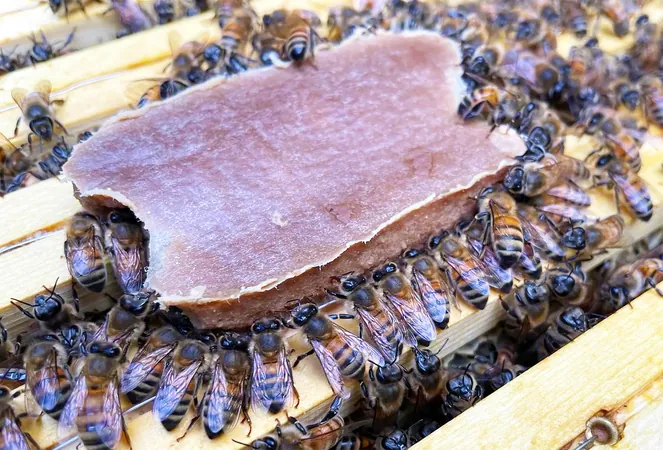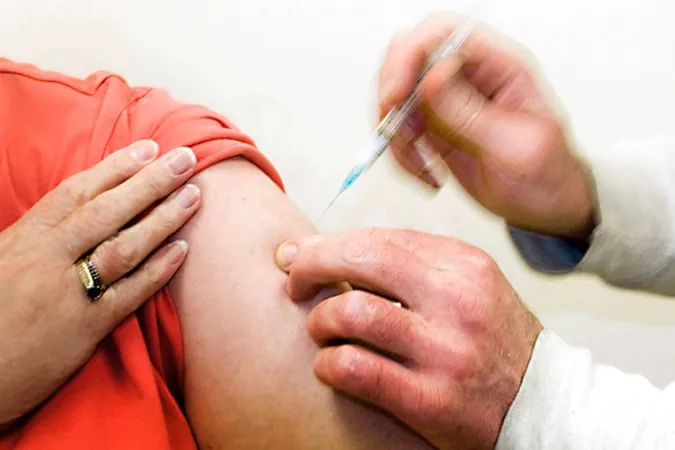
Revolutionary Superfood for Honey Bees Aims to Save Global Food Supply
2025-08-22
Author: Emma
A Lifeline for Honey Bees
Honey bees play a crucial role in our food systems around the globe, supporting crops, ecosystems, and economies through their relentless pollination efforts. However, these vital insects are facing a crisis due to habitat loss, pesticide exposure, climate extremes, and inadequate nutrition. Reports from beekeepers worldwide reveal unsustainable losses, raising concerns over food production stability.
Introducing an Innovative Solution
In a groundbreaking effort, scientists have developed a remarkable superfood designed to sustain honey bee colonies indefinitely, even in the absence of natural pollen. This breakthrough comes from a collaborative research initiative involving Washington State University (WSU) and APIX Biosciences NV from Belgium.
A Food Source That Empowers Bees
This innovative diet works similarly to artificial feeds used for livestock and pets, providing honey bees with all essential nutrients. Study trials showed colonies previously under nutritional stress thrived on this new diet, creating a vital strategy to combat the alarming increase in colony collapse.
Bees Need Variety to Survive
Bees are generalists that require a diverse diet for optimal health. Unfortunately, changing land uses, urban expansion, and extreme weather have severely limited their access to nutritious pollen sources. Brandon Hopkin, a distinguished professor at WSU, emphasizes that honey bees increasingly struggle to find a continuous supply of diverse nutrients essential for their survival.
Unprecedented Research Collaboration
The development of this superfood is the result of over a decade of extensive research and collaboration among three key teams. According to lead author Thierry Bogaert, APIX Biosciences tested thousands of ingredient combinations to perfect this nutrient-rich feed, aided by expertise from WSU and input from California’s leading beekeepers.
Discovering Critical Nutrients
A significant finding of the study was the identification of isofucosterol, a nutrient essential for bee survival found naturally in pollen. Unlike previously assumed sterols, isofucosterol deficiency led to reduced brood growth and impaired bee coordination, making it vital for overall colony health.
Real-World Effectiveness Proved
To assess practical effectiveness, the WSU team tested the new diet in blueberry and sunflower fields, notorious for poor pollen quality. Results showed that colonies on the complete diet experienced higher survival rates and growth compared to those on traditional feeds. Remarkably, these colonies demonstrated feed efficiency comparable to natural pollen, highlighting that this artificial feed may indeed replace the need for pollen.
Hope for Pollination Practices
Many beekeepers have strayed from pollinating certain crops like blueberries due to colony losses. However, this new dietary innovation might encourage them to return, knowing their bees are more likely to survive the rigors of pollination.
A Promising Future for Food Production
As annual colony losses reach alarming levels, this breakthrough offers newfound hope. The study showed that colonies fed with the complete diet remained robust throughout the year, even during challenging conditions. Pilkington, CEO of APIX Biosciences, is hopeful that by mid-2026, this product will significantly benefit beekeepers and the agricultural community.
Transforming the Future of Beekeeping
By addressing the critical nutritional gaps faced by honey bees, this innovative superfood has the potential to reshape pollination practices, reduce colony losses, and reinforce the food systems reliant on these industrious pollinators.









 Brasil (PT)
Brasil (PT)
 Canada (EN)
Canada (EN)
 Chile (ES)
Chile (ES)
 Česko (CS)
Česko (CS)
 대한민국 (KO)
대한민국 (KO)
 España (ES)
España (ES)
 France (FR)
France (FR)
 Hong Kong (EN)
Hong Kong (EN)
 Italia (IT)
Italia (IT)
 日本 (JA)
日本 (JA)
 Magyarország (HU)
Magyarország (HU)
 Norge (NO)
Norge (NO)
 Polska (PL)
Polska (PL)
 Schweiz (DE)
Schweiz (DE)
 Singapore (EN)
Singapore (EN)
 Sverige (SV)
Sverige (SV)
 Suomi (FI)
Suomi (FI)
 Türkiye (TR)
Türkiye (TR)
 الإمارات العربية المتحدة (AR)
الإمارات العربية المتحدة (AR)